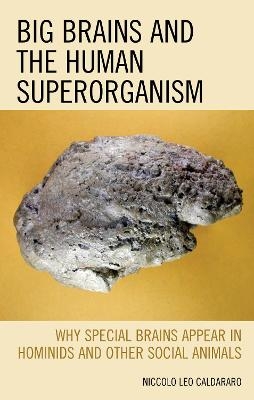
Big Brains and the Human Superorganism
Lexington Books (Verlag)
978-1-4985-4089-6 (ISBN)
This book examines why humans have big brains, what big brains enable us to do, and how specialized brains are associated with eusociality in animals. It explores why brains expanded so slowly, and then why they stopped growing. This book whittles down the theories on brain size evolution to a few that represent testable hypotheses to identify logical and practical explanations for the phenomenon. At the core of this book is data derived from original, previously unpublished research on brain size in a number of social mammals. This data supports the idea that evolution of the brain in humans is the result of social interaction. This book also traces the products of the social brain: ideology, religion, urban life, housing, and learning and adapting to dense complex social interactions. It uniquely compares brain evolution in social animals across the animal kingdom, and examines the nature of the human brain and its evolution within the social and historical context of complex human social structures.
Niccolo Leo Caldararo is lecturer of anthropology at San Francisco State University.
Part I: Brains and Performance
Chapter 1: Cranimania and Human Behavior
Chapter 2: Brains: What are They Good For?
Chapter 3: Group Size, Territory and Disease
Chapter 4: Performing as Human or as a Social Being
Chapter 5: Smooth Brains, Convolutions, Complexity and Ability
Chapter 6: Brain Sizes, Bigness and Neurons
Chapter 7: A Brain of Two Parts: Cortex vs. Cerebellum
Chapter 8: The Future of the Human Brain
Part II: History of a Genus and the Evolution of Society
Chapter 9: Anthropocentric or Indifferent Universe?
Chapter 10: Racism As a Human Disease
Chapter 11: Learning and “Hard Wiring”
Chapter 12: The Housing Crisis and Homelessness
Chapter 13: On the Curious Illusion of Human Uniqueness
References
About the Author
| Erscheinungsdatum | 10.05.2021 |
|---|---|
| Verlagsort | Lanham, MD |
| Sprache | englisch |
| Maße | 154 x 223 mm |
| Gewicht | 431 g |
| Themenwelt | Geisteswissenschaften ► Psychologie ► Biopsychologie / Neurowissenschaften |
| Medizin / Pharmazie ► Medizinische Fachgebiete | |
| Medizin / Pharmazie ► Studium | |
| Naturwissenschaften ► Biologie ► Evolution | |
| Naturwissenschaften ► Biologie ► Humanbiologie | |
| Naturwissenschaften ► Biologie ► Zoologie | |
| ISBN-10 | 1-4985-4089-9 / 1498540899 |
| ISBN-13 | 978-1-4985-4089-6 / 9781498540896 |
| Zustand | Neuware |
| Haben Sie eine Frage zum Produkt? |
aus dem Bereich


